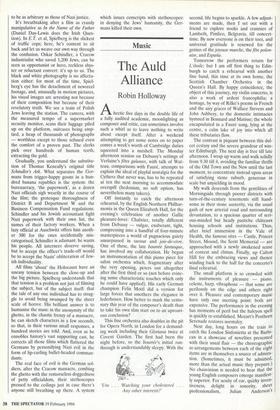Music
The Auld Alliance
Robin Holloway
Ahectic five days in the double life of a fully audited academic, moonlighting as composer and critic, can sometimes involve such a whirl as to leave nothing to write about except itself. After a weekend attempting to get some notes on to paper comes a week's worth of Cambridge duties squeezed into a nutshell. The Monday afternoon session on Debussy's settings of Verlaine's fetes galantes, with talk of Wat- teau, comparisons with Faure, attempts to explain the ideal of playful nostalgia for the Cythera that never was, has to be repeated at ten the next morning to accommodate overspill (hedonism, no soft option, has nevertheless many takers).
Off instantly to catch the afternoon rehearsal, by the English Northern Philhar- monia in the Queen Elizabeth Hall, for the evening's celebration of another Gallic pleasure-lover: Chabrier, totally different from Debussy — vulgar, exuberant, tight, compressing into a handful of four-minute masterpieces a world of pugnacious gaiety unsurpassed in savour and joie-de-vivre. One of these, the late bourree fantasque, has involved my collaboration. He began an instrumentation of this piano piece for salon orchestra which, fragmentary after the very opening, peters out altogether after the first third or so (not before evinc- ing some characteristic touches which only he could have applied). His early German champion Felix Mottl did a version for large forces that smothers the elegance in lederhosen. How better to mark the cente- nary this year of the composer's death than to take his own slim start on to an uproari- ous conclusion?
This fine orchestra also doubles in the pit for Opera North, in London for a demand- ing week including their Gloriana twice at Covent Garden. The first had been the night before, so the bourree's initial run- through is understandably sleepy. With the 'Urn . Watching your cholesterol . . .
Any other interests?' second, life begins to sparkle. A few adjust- ments are made, then I set out with a friend to explore nooks and crannies of Lambeth, Pimlico, Belgravia, till concert- time. By now everyone is on their toes, and universal gratitude is renewed for the genius of the joyeuse marche, the fete polon- aise, and Espana.
Tomorrow the performers return for L'etoile; but I am off first thing to Edin- burgh to catch a rehearsal with another fine band, this time at its own home, the Scottish Chamber Orchestra in the Queen's Hall. By happy coincidence, the object of this journey, my violin concerto, is also a work of ardent francophilia; a homage, by way of Rilke's poems in French and the airy graces of Wallace Stevens and John Ashbery, to the domestic intimacies hymned in Bonnard and Matisse; the whole encapsulated in a Faure song, Iying at the centre, a calm lake of joy into which all these tributaries flow.
The contrast is piquant between this dul- cet ecstasy and the severe grandeur of win- ter Edinburgh. The next day is free till late afternoon. I wrap up warm and walk solidly, from 9.30 till 4, avoiding the familiar thrills of the Old Town and the New until the last moment, to concentrate instead upon areas of satisfying stone suburb, generous in scale but unyielding in mood.
My walk descends from the gentilities of Morningside through poorer districts with turn-of-the-century tenements still hand- some in their stone austerity, via the usual gash of new arterial road and surrounding devastation, to a spacious quarter of seri- ous-minded but heady pastiche châteaux housing schools and institutions. Thus, after brief immersion in the Vale of Health, the famous sites -- Castle, Princes Street, Mound, the Scott Memorial — are approached with a newly awakened sense of context and climax. Finally, up Calton Hill for the embracing views and thence winding back to the hall for the concerto's final rehearsal.
The small platform is so crowded with the instruments of pleasure — piano, celeste, harp, vibraphone — that some arc perilously on the edge and others right over it. Pleasure and contemporary music have only one meeting point: both are expensive. The performance in the evening has moments of peril but the halcyon spell is quickly re-established. Mozart's Posthorn Serenade restores normalcy.
Next day, long hours on the train to catch the London Sinfonietta at the Barbi- can in a showcase of novelties presented with their usual flair — the choreographic re-arrangements between each of the eight items are in themselves a source of admira- tion. (Sometimes, it must be admitted, more than the actual music they prepare.) No chauvinism is needed to hear that the young English composers emerge manifest- ly superior. For acuity of ear, quirky inven- tiveness, delight in sonority, sheer
professionalism, Julian Anderson s
Tiramisu seems the more fully-achieved, by remaining within its limits and realising their every potential. Far longer and more elaborate, Living Toys seems a mixture of bubbles and sequins, amazing in its glitters and glints, so wholly avoiding dense matter as to be in danger of avoiding content alto- gether. Striking in both, however, was the lack of youthful daring. They display enor- mous know-how and polish, fulfilling expectation at a high level within the going norms. But this apparently replaces the long shot, the ambitious venture that, pos- sibly callow and overreaching, nevertheless risks the heavens. It's as if they only had Calais in view, rather than Paris.



















































 Previous page
Previous page